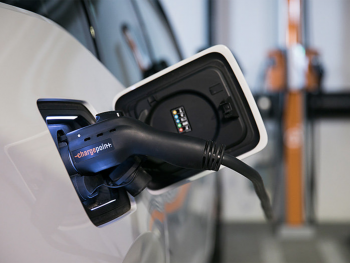Comment: Why fleets have a critical part to play in the UK’s green recovery
André ten Bloemendal, VP Europe for ChargePoint, discusses the outlook for electric transport being more promising than ever despite the impacts of COVID-19, its potential to be the driving force in recovery and the important role fleets have to play.

If all ground transport was electric, the resulting drop in air pollution would result in annual health savings of £4.5bn, estimates a new study on Toronto in Canada
If there has been one bright spot in 2020, it’s that we’ve all seen with shocking speed that clearer skies and quieter roadways are not only possible, they’re within reach. Whilst the pandemic has exposed how quickly everything we once took for granted can be upended, it is also waking many to the fact that we have a chance to, as the United Nations (UN) puts it, “build back better.” How governments respond in the coming weeks and months will have a lasting impact on economies, health and the environment for generations to come. Business and government leaders are keen to take advantage of this moment to accelerate their companies’ and nations’ climate goals. Fleets will play a vital role in those efforts.
Business leaders call for a green recovery
In May, more than 150 brands with a collective net worth of nearly £2tr appealed to governments around the globe to “align recovery policies with climate science.” Here at home, over 200 CEOs and investors from top UK firms including Heathrow, HSBC and National Grid have called on Prime Minister Boris Johnson to set out a green recovery plan that prioritises the environment, demanding “a clean, just recovery.” It is imperative, then, that the UK follows in the footsteps of the EU, which plans to invest €80bn (£71.6bn) to boost electric vehicle sales and double the investment in charging networks.
There’s a reason for optimism.
Last year, the Commission on Climate Change (CCC) identified the mass adoption of electric vehicles as the “least-cost pathway” toward achieving the Government’s goal of net-zero greenhouse gas (GHG) emissions by 2050. During his campaign, Johnson himself called for £500m to expand the country’s charging network, promising that “everyone in England and Wales [will be] within 30 miles of an electric vehicle charge point.”
The future will be electric
Whilst car sales are down overall this year, registrations for EVs have more than doubled across Europe, including here in the UK. Analysts predict those trends will continue.
Here at ChargePoint, we had expected 2020 to be the year of electric fleet pilots. After all, prior to the global pandemic retail giant Amazon ordered 100,000 delivery trucks from electric start-up Rivian and UK EV-maker Arrival secured a £340 million commitment from United Parcel Service (UPS) for 10,000 delivery vans, with an option to purchase 10,000 more.
What we’ve witnessed instead are several high-profile EV implementations, from global brands like PepsiCo and FedEx to corporate motor pools and municipal transit fleets. In addition to increased investments in fleet electrification, there are new opportunities to partner with businesses, fuelling centres, utilities and government to bring fleets and drivers even more charging options.
Benefits for people, the planet and the purse
The International Energy Agency (IEA) recently put out a Sustainable Recovery Plan highlighting the urgency of the moment. IEA Executive Director, Dr. Fatih Birol, said of the organisation’s conclusions, “Governments have a once-in-a-lifetime opportunity to reboot their economies and bring a wave of new employment opportunities while accelerating the shift to a more resilient and cleaner energy future.”
Electric vehicles aren’t only good for people’s purses and the planet — they’re good for public health. A new Canadian study found that if all ground transport (including cars, transit and fleet vehicles) in Toronto were electric, the resulting drop in air pollution would result in annual health savings of £4.5bn. That means each EV on the road is worth £8,000 in life-saving benefits! Researchers said the findings “could apply to nearly every city in the world.”
A sustainable opportunity
Recovery efforts are a unique opportunity to more closely align climate commitments with economic development and NHS goals. According to the IEA research, making targeted investments and implementing certain programmes, such as fuel efficiency and emissions standards and scrappage schemes, could save or create nearly 9 million jobs annually and boost global economic growth by more than 1% a year, while also reducing global GHG emissions by 4.5 billion tonnes by mid-decade. The installation and manufacturing of electric charging points alone could support around 15 jobs per £1m of investment.
Incentivising the design and construction of charging infrastructure could immediately put electricians, construction workers, engineers and other supporting businesses back to work, whilst also providing increased charging capacity.
The electrification of transport will create and support local jobs, reduce vehicle operation and maintenance costs for fleets and improve air quality and health and those benefits will extend far beyond the current year.
At long last, the will to address climate change seems unanimous — and the way becoming clearer by the moment.
charge pointsChargePointCoronavirusCOVID-19electricEVfleetinfrastructureinvestment

